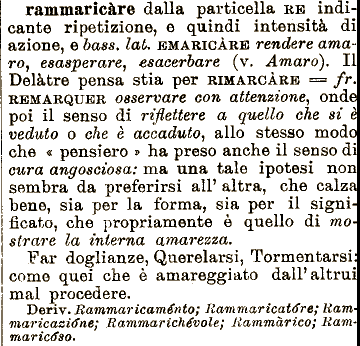lunedì 16 giugno 2008
Etimologie - Etymologies #10
Pubblicato da
Gianluca C.
alle
09:16
0
commenti
![]()
Etichette: El Padrino, Etimologie - Etymologies
sabato 16 febbraio 2008
Drain the lizard.

From a supposed resemblance of the penis to a lizard.
Verb
Drain the lizard (vulgar, of a male) To urinate.
"Be right back. Gotta go drain the lizard."
Pubblicato da
Gianluca C.
alle
10:29
4
commenti
![]()
Etichette: El Padrino, Etimologie - Etymologies
martedì 8 gennaio 2008
Etimologie - Etymologies #9
- 1531 (but not common until mid-17c.), from L. adultus, pp. of adolescere "grow up, mature" (see adolescent). As a euphemism for "pornographic," it dates to 1958 and does no honor to the word. The noun meaning "adult person" is from 1658.
Pubblicato da
Gianluca C.
alle
08:41
2
commenti
![]()
Etichette: El Padrino, Etimologie - Etymologies
lunedì 24 dicembre 2007
Etimologie - Etymologies #8
Festa = Feast
c.1200, from O.Fr. feste "festival, feast," from V.L. *festa (fem. sing.), from L. festa "holidays, feasts," from neut. pl. of festus "festive, joyful, merry," related to feriæ "holiday" and fanum "temple." The spelling -ea- was used in M.E. to represent the sound we mis-call "long e." The verb first attested c.1300.
Pubblicato da
Gianluca C.
alle
18:19
0
commenti
![]()
Etichette: El Padrino, Etimologie - Etymologies
lunedì 17 dicembre 2007
Etimologie - Etymologies #7
Parente = Relative
1388, "a relative pronoun," from O.Fr. relatif (13c.), from L.L. relativus "having reference or relation," from L. relatus, pp. of referre "to refer." Meaning "person in the same family" first recorded 1657; the adj. is attested from 1530. Relatively "in relation to something else" is recorded from 1561. Relativism in philosophy first recorded 1865 (relativist is from 1863).
Pubblicato da
Gianluca C.
alle
11:17
0
commenti
![]()
Etichette: El Padrino, Etimologie - Etymologies
lunedì 10 dicembre 2007
Etimologie - Etymologies #6
Sensibile = Sensitive
c.1400, "having the function of sensation," from M.Fr. sensitif (13c.), from M.L. sensitivus "capable of sensation," from L. sensus, pp. of sentire "feel perceive" (see sense). Meaning "easily affected" (with ref. to mental feelings) first recorded 1816; meaning "having intense physical sensation" is from 1849. Original meaning is preserved in sensitive plant (1633). Meaning "involving national security" is recorded from 1953. Sensitivity training is first attested 1954. Sensitize first recorded 1856, originally in photography; of persons from 1880.
Pubblicato da
Gianluca C.
alle
12:37
0
commenti
![]()
Etichette: El Padrino, Etimologie - Etymologies
lunedì 26 novembre 2007
Etimologie - Etymologies #5
Mostro = Monster
c.1300, "malformed animal, creature afflicted with a birth defect," from O.Fr. monstre, from L. monstrum "monster, monstrosity, omen, portent, sign," from root of monere "warn" (see monitor). Abnormal or prodigious animals were regarded as signs or omens of impending evil. Extended c.1385 to imaginary animals composed of parts of creatures (centaur, griffin, etc.). Meaning "animal of vast size" is from 1530; sense of "person of inhuman cruelty or wickedness" is from 1556. In O.E., the monster Grendel was an aglæca, a word related to aglæc "calamity, terror, distress, oppression."
Pubblicato da
Gianluca C.
alle
12:55
0
commenti
![]()
Etichette: El Padrino, Etimologie - Etymologies
lunedì 19 novembre 2007
Etimologie - Etymologies #4
Pubblicato da
Gianluca C.
alle
09:53
2
commenti
![]()
Etichette: El Padrino, Etimologie - Etymologies
domenica 11 novembre 2007
Etimologie - Etymologies #3
Invidia = Envy
envy †malice; feeling of ill will at another's well-being. XIII. — (O) France, envie, semi-pop. — Latin, invidia malice, ill will, f. invidēre look maliciously upon, grudge, envy, f. in upon, against + vidēre see; see EN-1, VISION.
So envy vb. XIV.
Pubblicato da
Gianluca C.
alle
10:31
1 commenti
![]()
Etichette: El Padrino, Etimologie - Etymologies
lunedì 29 ottobre 2007
Etimologie - Etymologies #2
- O.E. yfel (Kentish evel) "bad, vicious," from P.Gmc. *ubilaz (cf. O.Saxon ubil, Goth. ubils), from PIE *upelo-, giving the word an original sense of "uppity, overreaching bounds" which slowly worsened. "In OE., as in all the other early Teut. langs., exc. Scandinavian, this word is the most comprehensive adjectival expression of disapproval, dislike or disparagement" [OED]. Evil was the word the Anglo-Saxons used where we would use bad, cruel, unskillful, defectiveharm, crime, misfortune, disease. The meaning "extreme moral wickedness" was in O.E., but did not become the main sense until 18c. Evil eye (L. oculus malus) was O.E. (adj.), or eage yfel.
Pubblicato da
Gianluca C.
alle
17:37
4
commenti
![]()
Etichette: El Padrino, Etimologie - Etymologies
mercoledì 17 ottobre 2007
Etimologie - Etymologies #1
Pubblicato da
Gianluca C.
alle
10:33
2
commenti
![]()
Etichette: El Padrino, Etimologie - Etymologies





